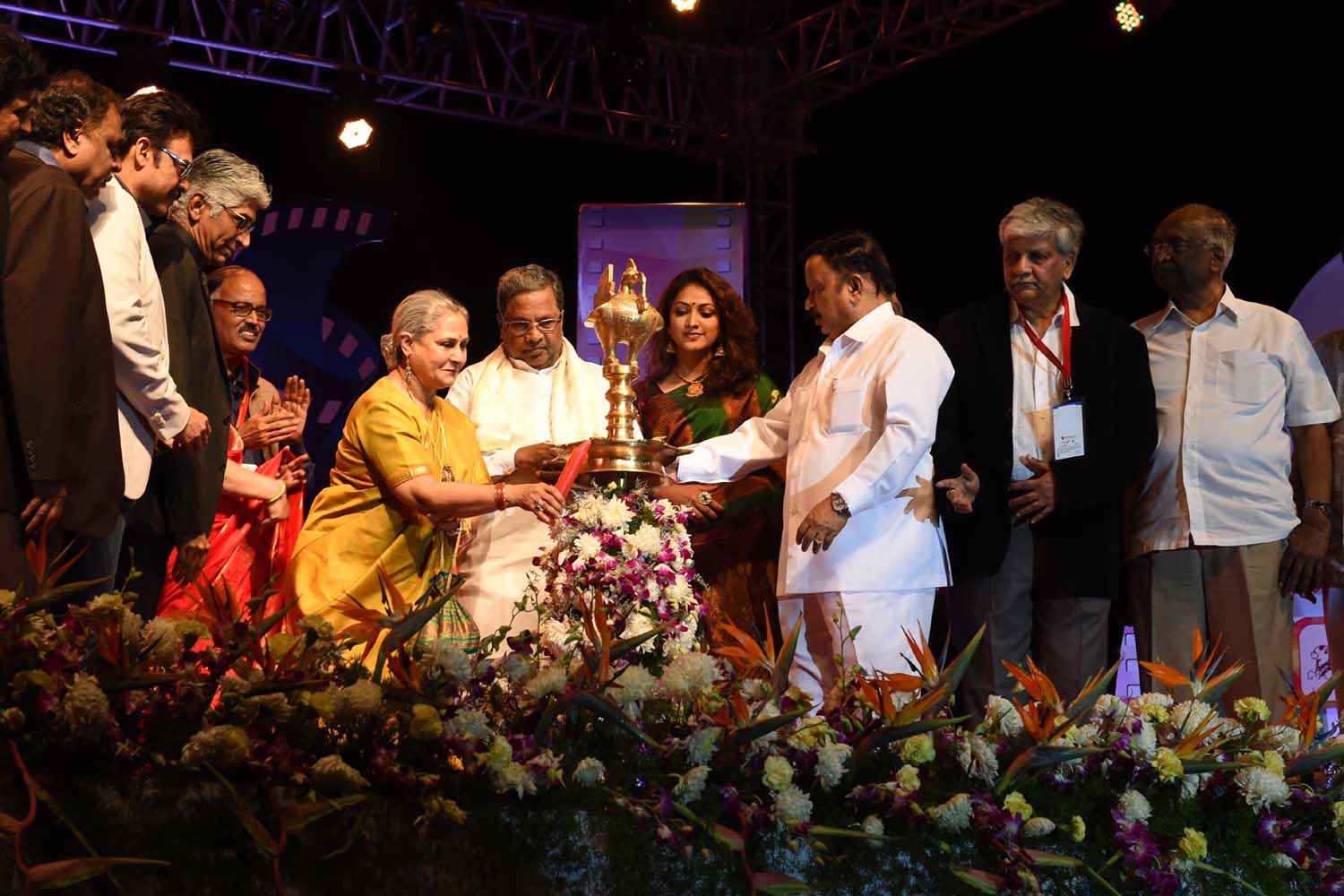The 5th edition of the Indian Screenwriters Conference (ISC) was inaugurated today by Chief Guest Aamir Khan. The eagerly awaited biennial which is organised by the Screenwriters Association (SWA) is being held from August 1-3 at St. Andrews Auditorium, Bandra.
The theme of this year’s conference is ‘Where Mind Is Without Fear’ that focuses on the challenges facing Indian screenwriters today.
Present at the opening ceremony were Mr. Sanjay Chouhan – SWA Executive Committee member and Convenor of the 5th ISC. Also present were Mr. Sunil Salgia – SWA Executive Committee member and Co-convenor of the 5th ISC, Mr. Zama Habib – General Secretary of the SWA and Preeti Mamgain – President of the SWA.
Post this, scriptwriter and SWA Executive Committee member Anjum Rajabali (Ghulam, Raajneeti) engaged in a candid conversation with Aamir Khan much to the delight of the audiences. The conversation was about his take on scriptwriting, his experience of being a producer, working with scriptwriters and why they deserve to be respected and compensated well.
In the course of the conversation, Khan also shared interesting anecdotes on how he ended up producing Lagaan (2001) after rejecting it initially and why he takes a share in the profits. The actor-producer also remarked that he was glad to be finally attending the Indian Screenwriters Conference after several unsuccessful attempts in the past.
Khan also said that he believes in giving writers their due respect and rights and considers them an extremely important part of the filmmaking process. Having worked on the scripts of his films namely Qayamat Se Qayamat Tak (1988), Jo Jeeta Wohi Sikandar (1992) and Hum Hain Rahi Pyaar Ke (1993) has also helped him to understand the scriptwriting process and a writer’s psyche in a much better way, the actor confided.
He also added that a script undergoes an instrumental journey from the idea to the execution stage and can play a big role in altering one’s opinion about the same.
Khan cited the example of Lagaan and admitted that he found the initial idea of the film bizarre when Ashutosh Gowarikar narrated it. But after Gowarikar came to him with a full-fledged script and screenplay, Khan by his own admission was blown off and agreed to act and produce in it.
Panel 1st
The first panel ‘Writers Vs Producers: Can They Never Be Allies?’ with the speakers including Aamir Khan, directors Amit Masurkar (Newton, Sulemaani Keeda), Akshat Verma (Kaalakaandi, Delhi Belly), Somen Mishra (Head Of Development – Dharma Productions) and Siddharth Roy Kapur (President of Film & TV Producers’ Guild, Ex M.D and C.E.O – Disney India) was about the love-hate relationship shared by writers and producers.
Moderated by Anjum Rajabali, the panel saw the speakers discuss the complex equation shared by writers and producers, the steps that can be taken to ensure that both work on the same wavelength, ensuring writers are given their due rights and are fairly compensated.
Akshat Varma said that rather than blaming the producers, he wanted to understand them, their psyche and what makes them tick. When the conversation veered to writers do not get their due rights and compensation, Khan said that many people in the industry are not trained to read scripts, while many writers are not willing to take an honest feedback on their scripts which often leads to a friction between both the parties. However, the panel unanimously agreed that while writers need to be given their due, they also need to work and keep improving their scriptwriting skills.
Aamir Khan who was extremely delighted to be the Chief Guest at the inaugural ceremony of the 5th Indian Screenwriters Conference said, “I have always believed scriptwriters are an extremely important part of the filmmaking process. And they need to be given their due and the respect they deserve. For I truly believe that the film industry will grow only when the writers grow.”
Writer-director Amit Masurkar was also extremely enthused to be a part of the panel ‘Writers Vs Producers: Can They Never Be Allies?’ on Day 1 of the 5th Indian Screenwriters Conference and said, “It’s important for writers to come together and talk about what affects them in order to come up with creative and practical solutions. A conference like the one SWA organises is a step in the right direction.”
President of Film & TV Producers’ Guild Siddharth Roy Kapur was happy to be a part of the Screenwriters Conference yet again and said, “It is a great experience to attend the 5th Indian Screenwriters Conference. I am really thankful to Anjum (Rajabali) for inviting me once again to this wonderful forum. It always feels great when creative professionals get together with an agenda of exchanging ideas, the challenges they face and the ways to tackle them.”
Panel 2nd
The Panel ‘Blurred Lines Between History, Mythology and Fantasy’ which was moderated by journalist and author Kavita Kane (Sita’s Sister, Menaka’s Choice), the panel included Siddharth Kumar Tewary (Creative Producer – Mahakali, Mahabharat), writer C.L Saini (Devon Ke Dev Mahadev, Prithviraj Chauhan), Dr. Boddhisatva (Research Head – Meharunnisa, Mahabharat) and writer and veteran theatre personality Shama Zaidi (Shatranj Ke Khiladi, Garam Hawa) was about writing mythology, the challenges involved in it and differentiating between history, mythology, fantasy and folklore.
Dr. Boddhisatva said, “As Indian mythology is vast, it has led to the rise of various other stories being formed around the original story and today we have reached a point where many variations are being added to the individual mythological stories providing various flavours. Due to commercial purposes of episodes, the castings of certain characters at times are done wrongly which in turn leads to inappropriate story decisions.”
Citing the example of the TV show Ramayana, Dr Boddhisatva said, “I was asked to kill the character of Sugreev as the casting for it had gone wrong. And in response to that I had pointed out that in Ramayana, it is Bali who dies and not Sugreev. Similarly, inappropriate stories like Draupadi getting married to Karna are being made. This in turn bids farewell to the authenticity of the story due to the various versions of the story that are available to us.”
Panel 3rd
The final panel of the day was ‘Between The Hits’ which was moderated by Ketki Pandit (playwright and former head – Screenplay writing – FTII). It included Nikhil Sane (Business head of Viacom 18 – Marathi Film Division), writer-director Ravi Jadhav (Natrang, Nude), playwright and screenplay writer Manaswini L.R (Kaccha Limbu, Ti Saddhya Kaay Karte) and writer – director Abhishek Jain (Bey Yaar, Kevi Rite Jaish).
The last 2 decades have seen Marathi and Gujarati cinema a force to reckon with Modest budgets coupled with the State Government’s incentives have helped these industries to create films that have been creative and commercial successes. However, these industries also see a large number of failures every year.
The panel spoke about the reason behind these failures, the problems prevailing in these industries and the steps that can be taken to overcome these challenges in order to emerge with more successful films.
Writer-director Ravi Jadhav who was part of the panel ‘Between The Hits’ on Day 1 of the 5th Indian Screenwriters Conference said, “I think the Indian Screenwriters Conference is a great platform to encourage exchange of ideas with regards to scriptwriting, content creation and other initiatives for screenwriters. I hope that the screenwriters take the right learnings from it and use it to create content that is fresh, exciting and also learn to enter into projects that safeguard their commercial and other interests.”
Director Ravi Jadhav said that the success of Nagraj Manjule’s Sairat (2016) has created a benchmark that is difficult to surpass. It has also led to people coming up with similar stories set in the same milieu and proving to be box office failures.
But Jadhav also said that the Marathi audiences are well versed with critically acclaimed films and make it a point to watch them in the theatres besides being supportive towards out of the box content and also pure commercial cinema. The success of films Fandry (2014), Killa (2015) and Lai Bhaari (2014) are great examples of the same. He also said that the one act plays done in Marathi is very fresh and helped him to discover the idea for his movie Balak Palak (2013).
Director Abhishek Jain was equally excited to be a part of ‘Between The Hits’, his first ever panel at the Indian Screenwriters Conference and remarked, “When the first Screenwriters Conference happened in 2006, I had just joined film school and had attended the conference as an audience member. Coming on the panel now, several years later is a privilege also because it gave me an opportunity to share the stage with such immensely talented people. The takeaway from such an event is that as creative people we should be able to reach out to each other as this will also help newer ideas to develop. With Screenwriters Association, we have been doing workshop to introduce the people of Gujarat to the art of screen writing and it intend to do more of such activities.”
Abhishek Jain cited the failing of films in Gujarati cinema to varied reasons with lesser number of screens being the primary one. With just 200 screens dedicated to Gujarati films all over the state, it becomes a challenge to bring audiences to the theatre and convince distributors about getting the films released and its cost recovered.
He also said that the industry’s perception with regards to award winning films needs to change since they are of the opinion that when a film has not many commercial prospects, they are categorised as award winning films. The audience also share this perception and feel that if it’s an award-winning film, it may not be worth their time and money.
Lastly, he said that the filmmakers in the state need to be more sensitised and aware of the craft involved in the scripting process. In order to rectify this, the filmmaker has been organising screenwriting workshops in association with the SWA over the last 3 years.
Journey so far…
The Indian Screenwriters Conference was started with the idea of addressing issues concerning Indian screenwriters and lyricists, while also encouraging a dialogue on the surrounding social realities, within and outside the film and TV industries.
The first Indian Screenwriters Conference, held at FTII, Pune, in August 2006, was attended by 275 writers. The second, at the Indira Gandhi Institute of Development Research, next to Film City, Mumbai, in December 2008; saw 575 screenwriters and writer-directors attending it. 3ISC at St. Andrew’s Auditorium, Bandra, in February 2013, had the participation of 700 screenwriters. ISC, held in August 2016, was the biggest with over 900 screenwriters and industry professionals attending it.














Leave a Reply